利用非生长微生物进行生物纯化,改善植物蛋白成分。
IF 6.3
1区 农林科学
Q1 FOOD SCIENCE & TECHNOLOGY
引用次数: 0
摘要
要确保为不断增长的人口提供可持续的全球粮食供应,就必须转向更多的植物性饮食。因此,植物性蛋白质的应用越来越多,但难闻的异味使其使用变得复杂。在这里,我们筛选了 97 种微生物,以确定它们在限制可发酵糖量的过程中去除异味的潜力。这样就能生产出味道更中性、更纯净的食品配料,同时限制微生物的生长和典型发酵最终产品的生产。我们证明,各种乳酸菌(LAB)和酵母能去除 "绿色 "醛和酮。在杏仁、豌豆、马铃薯和燕麦蛋白中,这种转化可在一小时内完成。异发酵酵母菌最擅长醛和酮的中和,而微生物挥发物(如乙酸乙酯(甜味、果味)或α-二酮(黄油和奶酪味))的新形成则最少。虽然感官特性得到了改善,但蛋白质溶解性、乳化性、起泡性和体外消化率的变化有限。本文章由计算机程序翻译,如有差异,请以英文原文为准。


Biopurification using non-growing microorganisms to improve plant protein ingredients
Securing a sustainable global food supply for a growing population requires a shift toward a more plant-based diet. The application of plant-based proteins is therefore increasing, but unpleasant off-flavors complicate their use. Here, we screened 97 microorganisms for their potential to remove off-flavors in a process with limiting amounts of fermentable sugar. This allowed the production of a more neutral-tasting, purified food ingredient while limiting microbial growth and the production of typical fermentation end products. We demonstrate that various lactic acid bacteria (LAB) and yeasts remove “green” aldehydes and ketones. This conversion can be carried out in less than one hour in almond, pea, potato, and oat proteins. Heterofermentative LAB was best at aldehyde and ketone neutralization with minimum de novo formation of microbial volatiles such as ethylacetate (sweet, fruity) or alpha-diketones (butter- and cheese-like). While sensory properties were improved, changes in protein solubility, emulsification, foaming, and in vitro digestibility were limited.
求助全文
通过发布文献求助,成功后即可免费获取论文全文。
去求助
来源期刊

NPJ Science of Food
FOOD SCIENCE & TECHNOLOGY-
CiteScore
7.50
自引率
1.60%
发文量
53
期刊介绍:
npj Science of Food is an online-only and open access journal publishes high-quality, high-impact papers related to food safety, security, integrated production, processing and packaging, the changes and interactions of food components, and the influence on health and wellness properties of food. The journal will support fundamental studies that advance the science of food beyond the classic focus on processing, thereby addressing basic inquiries around food from the public and industry. It will also support research that might result in innovation of technologies and products that are public-friendly while promoting the United Nations sustainable development goals.
 求助内容:
求助内容: 应助结果提醒方式:
应助结果提醒方式:


